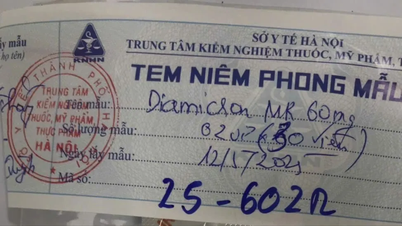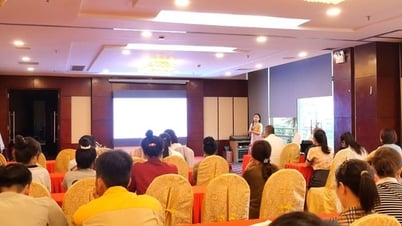
Force on duty spraying disinfectants at the hospital - Photo: THANH HUY
On May 29, the Hospital for Tropical Diseases (HCMC) and the Oxford University Clinical Research Unit (OUCRU) organized a scientific conference on Application of artificial intelligence (AI) and big data in clinical practice of infectious diseases.
Dr. Nguyen Thanh Dung, Director of the Hospital for Tropical Diseases, said that infectious diseases are always a major challenge to public health, especially in countries with tropical climates like Vietnam.
Historical and recent epidemics such as COVID-19 and the Omicron variant demonstrate the complexity and unpredictability of pathogens.
According to Dr. Dung, finding solutions to control and repel infectious diseases is necessary. The role of AI and big data is no longer a distant concept, but has become a powerful tool, bringing unlimited potential in the medical field.
"The Tropical Diseases Hospital and OUCRU always strive to apply new technology to medical examination and treatment practices and scientific research.
We believe that the combination of in-depth clinical experience and technological strength has created leaps and bounds in the fight against infectious diseases and infections," said Dr. Dung.

Dr. Nguyen Van Vinh Chau - President of the Ho Chi Minh City Infectious Diseases Association - said that there is a never-ending war between humans and microorganisms - Photo: X.MAI
In the report "Medical innovation and the endless challenge of infectious diseases", Dr. Nguyen Van Vinh Chau - Deputy Director of the Ho Chi Minh City Department of Health, Chairman of the City Infectious Diseases Association - said that pathogens always evolve (due to mutations) to adapt highly to all pressures (including the host's immune system, antibiotics, and environmental factors).
Humans are constantly faced with the emergence of new agents that emerge or re-emerge, or that are resistant to existing antibiotics. Therefore, there is a never-ending war between humans and microorganisms.
To cope with the endless challenge of infectious diseases, according to Dr. Vinh Chau, a comprehensive, systematic approach to infectious diseases is needed.
At the same time, scientific research and analysis of past epidemics are needed to draw lessons in responding to future outbreaks of new or re-emerging agents.
Innovation is also an important measure to successfully implement a comprehensive systems approach to infectious diseases.
According to Dr. Vinh Chau, artificial intelligence (AI) technology has great potential in preventing and controlling infectious diseases.
AI can assist in all stages of pre-pandemic, early pandemic, pandemic, as well as recurring epidemics, risk assessment, policy formulation, vaccine development.
"Advances in modern medical innovation allow for a comprehensive and systematic approach to infectious disease.
Measures to impact the body's immune system to create a protective response through research and development of new generation drugs and vaccines will be the basic solution to "coexist" with the microbial world ," concluded Dr. Vinh Chau.
Improving disease prediction and early warning capabilities
Dr. Le Duy Tung - Deputy Director of the Hospital for Tropical Diseases - said that from 2018 to now, the hospital has carried out 22 research projects applying AI and big data, including studies on forecasting flu and dengue fever, recognizing handwriting in medical records using machine learning...
AI and big data help hospitals improve their ability to predict and warn of epidemics early.
However, the process of implementing AI - Big Data still faces many challenges. To overcome them, the hospital is promoting cooperation with domestic and foreign partners, especially universities and technology companies.
Source: https://tuoitre.vn/22-du-an-nghien-cuu-cua-benh-vien-benh-nhet-doi-da-ung-dung-ai-20250529174535175.htm







![[Photo] Prime Minister Pham Minh Chinh attends the event "Digital transformation of the banking industry by 2025"](https://vphoto.vietnam.vn/thumb/1200x675/vietnam/resource/IMAGE/2025/5/29/0e34cc7261d74e26b7f87cadff763eae)




















![[Photo] Prime Minister Pham Minh Chinh receives leaders of Excelerate Energy Group](https://vphoto.vietnam.vn/thumb/1200x675/vietnam/resource/IMAGE/2025/5/29/c1fbe073230443d0a5aae0bc264d07fe)





























































Comment (0)